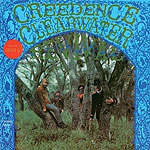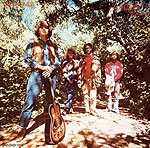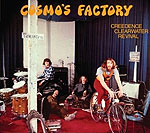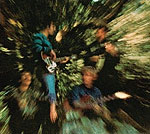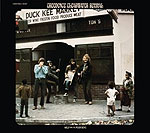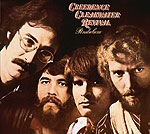
|
|||
|
|||
| Home |
| Gallery |
| Culture/ Technology |
| Fiction |
| Music |
| Poetry |
| Theater |
| What's New |
| About/Contact |
| Archive |
|
Remembering CCR 40 years on Reviewed October 2008
In July 1968, Creedence Clearwater Revival hit the airwaves and American consciousness with self-titled debut LP, the first of a string of six Platinum albums in a 2-1/2 year period. All six discs are being reissued, individually, by the original Fantasy label at the same time, re-mastered and including bonus live cuts and other rarities, original artwork, and liner notes by noted rock writers as Fortieth Anniversary Editions. The most commercially and critically successful American band of the time, Creedence was unusual at the time for playing rockabilly, roots-rock, and blues at a time when psychedelia, R&B and bubble-gum pop ruled (the top single in the United States in 1969 was "Sugar Sugar"; the top LP "In-A-Gadda-Da-Vida"). Though some may dismiss CCR as a singles band, to do so is to miss a great deal of the band's music by focusing on the millions of compilation discs sold since their 1971 breakup. They never had a No. 1 single, yet all six of these reissues originally went platinum or multi-platinum and did so on the cut-to-cut power of the albums as well as the heavy airplay of their singles and album cuts on AM, then FM radio. For those unfamiliar with the band, they began in the Bay Area in 1967 with brothers John Fogerty (lead vocals, lead guitar), Tom Fogerty (rhythm guitar), Stu Cook (bass) and Doug Clifford (drums). Awarded a record contract with Fantasy in 1968, they found some success with their first release, took the music world by storm in 1969 with three huge albums, and continued with two more monsters in 1970. Personnel tensions led to the departure of Tom Fogerty and the breakup of the original band. Cook and Clifford have toured performing the CCR songs as Creedence Clearwater Revisited and other names after the breakup, and Tom Fogerty passed away in 1990 after a solo career. John Fogerty, the signature voice and guitar sound of the band (though the rhythm section's contributions are often overlooked) began a solo career in 1973, along with a 15-year legal battle with the suits of Fantasy, refusing to play CCR songs for the most part from 1972 to 1987. A change in management at Fantasy has returned the band to the label and Fogerty now plays CCR's songs along with his many solo hits in concert. A look at the Fortieth Anniversary Edition discs: "Creedence Clearwater Revival": The sound was there from the start; a swampy, countrified, rockabilly sound from a band with roots in El Cerrito, California. The first record, not a smash hit at first, got attention for the extended, eight-minute-plus version of "Suzie Q" featuring plenty of guitar flash from Fogerty with a roots-rock vocal and drum beat (and, sung through a reverb, a rare vocal contribution by brother Tom on the second verse). The original album included three covers, "Ninety-Nine and Half," "Suzie Q" and Screaming Jay Hawkins' "I Put a Spell On You." The latter two were clearly highlights here, along with "Porterville" – which, with "Walk on the Water" were leftovers from the band's previous incarnation as the Golliwogs (the latter cut was also the only CCR cut to be co-written by the two Fogerty brothers, and contained a guitar solo virtually identical to the one in "Suzie Q"). The rest of the original issue was a preview of the more polished Creedence sound on later albums. The reissue features four bonus tracks: a B-side, "Call it Pretending," a conventional-sounding song which, unlike most early CCR songs, has background vocals and harmonies; a studio recording of Bo Diddley's "Before You Accuse Me" that features searing solos by Fogerty (a shorter version of the cut made it onto a later LP), and two live recordings: of "Ninety-Nine and Half" and "Suzie Q." These and other live bonus cuts offer a chance to catch the band when it was in its prime and able to stretch out. In the 11-minute-plus version of the latter tune, Fogerty pulls out all the stops and the band is tight throughout. Ben Fong-Torres wrote the liner notes. "Bayou Country": This disc contained the hit single "Proud Mary," along with several other songs that dominated FM play lists in early 1969. The band produced this album themselves, and it includes extended-length jam rockers "Born on the Bayou" and "Keep on Chooglin'," along with Little Richard's "Good Golly Miss Molly"(the only cover), "Bootleg" and "Penthouse Pauper," a blues guitar showpiece that along with "Molly" featured stinging, fluid Les Paul guitar licks from Fogerty. This was definitely Creedence's "Guitar Album"; its seven cuts showcasing Fogerty's considerable six-string dexterity. Later albums feature generally more much more economical playing. The formula, and Fogerty's growing songwriting skill, worked as the album went Top Ten and double platinum. The Fortieth Anniversary Reissue includes liner notes by music journalist Joel Selvin, and four bonus cuts: an alternate take of "Bootleg" with a bridge not heard on the LP version and a closing section using sandpaper for percussion, live versions of "Born on the Bayou" and "Proud Mary" that sound great, and a blues jam called "Crazy Otto" that features Fogerty in psychedelic mode on guitar and harmonica, recorded live by a Bay area radio station. This cut is interesting in showing the subtle change in texture between this band's rockabilly sound and that of other Bay area acts, like Country Joe and the Fish and Jefferson Airplane, at around the same time. When he wanted to, Fogerty could sound like the other acid-rock Frisco lead players and does so here. "Green River:" Released in August, 1969 (two weeks after the first men walked on the moon), this was a different album than the first two in more ways than one. Gone were the extended instrumental jams and long solos. All songs except "Wrote a Song for Everyone" clocked in well under four minutes, and most sounded like singles, notably "Tombstone Shadow' and "Cross-Tie Walker." There was more of a country feel to some of the songs, particularly the title cut, and "Lodi," still covered by country artists today. There were two singles, "Bad Moon Rising" and "Green River," and both were huge hits, selling well enough that their B-sides, "Commotion" and "Lodi," were also released and charted. The album was arranged and produced by John Fogerty – as would be all subsequent CCR discs – and like its predecessor, had only one cover, a powerful version of "The Night Time is the Right Time," a standard best known for its reading by Ray Charles. The bonus cuts on the reissue include two instrumental tracks to unfinished songs without vocals, called "Broken Spoke Shuffle" and "Glory Be"; these are really throwaways that add nothing. Then, things get interesting: a live version of "Bad Moon Rising," followed by a live version of "Green River" that morphs into and out of "Suzie Q" – no rocket science needed here, the songs have nearly identical structure, but the impressive guitar chops on display are a delight, and the disc wraps with an excellent live version of "Lodi." Dave Marsh wrote the liner notes for this disc. "Willy and the Poor Boys": With "Green River" going to No. 1 and triple platinum, CCR figured it had its' template for success. "Willy and the Poor Boys" was released just three months later (November 1969), their fourth album in 16 months. The country feel from "River" was still emphasized, the covers this time included Leadbelly's "Cotton Fields" and the traditional "Midnight Special." There were catchy singles, especially the infectious title tune and "Fortunate Son," the first clearly political statement by Fogerty in the heat of the Vietnam era. Another social statement, "Don't Look Now," followed, to less effect. "It Came Out of the Sky" was a great cut that had a feel like some of the classic CCR singles. Nonetheless, "Willy" failed to do as well as the discs released before and after it (if one can term a No. 3, double platinum disc a disappointment). The reason was likely the existence, for the first time on a CCR album, of "filler"; there were two instrumentals on the disc, the first a harp and acoustic guitar two-chord jam called "Poorboy Shuffle" and the other a 3 1/2 minute blues guitar boogie, "Side O' The Road," puzzlingly placed before the album-closing blues guitar opus "Effigy." For this reissue, annotated by Ed Ward, the bonus cuts are live versions of "Fortunate Son"and "It Came Out of the Sky," and (a treat) a live rehearsal version of "Down on the Corner" played with Booker T. and the MG's – complete with Booker T. Jones' keyboards, and lead guitar tradeoffs between Fogerty and Steve Cropper. "Cosmo's Factory": The band took seven months to release this 1970 album, generally considered its masterpiece. The album drew from the strengths of its previous releases, a mixture of radio-friendly, single-length cuts including "Travelin' Band," "Up Around the Bend" and "Lookin' Out My Back Door," all which sold very well. Other tunes that received a lot of radio airplay were the B-sides of these, especially "Run Through the Jungle" and "Who Will Stop the Rain." (The latter cut, a thinly veiled allegory about the Vietnam war, was later used as the theme and title of a film version of the book "Dog Soldiers"). This album also featured four excellent covers, including "Before You Accuse Me," the rockabilly standards "Ooby Dooby" and "My Baby Left Me," and a hard rock, 11-minute version of the R&B classic "I Heard it Through the Grapevine." "Factory" had something for everybody, starting with the great opener, "Ramble Tamble," a powerhouse cut grafting a catchy roots-rock song around a soaring guitar bridge and including, on "Travelin' Band" and "Long As I Can See the Light," the use of saxophone for the first time on any CCR disc, played not surprisingly by John Fogerty. The three bonus cuts on the Reissue include an alternate take of "Travelin' Band" that features no horns or lead guitar, a live "Up Around the Bend" that is played faster than the LP version, and (another) live version of "Born on the Bayou," featuring the band jamming with Booker T. and the MG's. A minor quibble is that for all the legendary personnel, this cut is not nearly as tight as the concert bonus cut on the "Bayou Country" disc. Robert Christgau wrote the liner notes. "Pendulum": Appropriately titled, as following "Cosmo's" quad-platinum success, the band's artistic and popular fortunes began to swing the other way, somewhat. With five LPs having been released in a very short span, the band no doubt sensed that the formula may have been wearing a bit thin and there was an experimental feel on many of the cuts as a result. With no covers, it started with "Pagan Baby," a sort of "Bayou Country" redux, with Fogerty in great voice and slashing guitar for over six minutes of roots-rock raving. Then came "Sailor's Lament," with organ and female backup singers, a Jamaican beat, and sax solos, and fans realized that they weren't on the bayou anymore. "Chameleon" follows, an R&B-flavored cut with electric piano and horns that resembles the Stax songs of the period, like "Knock on Wood," a clear nod by Fogerty to his R&B influences. "Born to Move" rocked hard with a horn section and long organ solo – a sign that the jam sessions with Booker T. and the MG's were having an impact on Fogerty's songwriting. "Molina" was another good rocker, with Fogerty trading his axe for his sax on the solos to good effect. "Pagan Baby," the powerhouse "Hey Tonight" (probably the hardest rocking of any of CCR's singles) and "Have You Ever Seen the Rain" recalled the old sound of the band; keyboards dominate many of the other cuts, and the sound montage closing out the album, "Rude Awakening #2," was six weak minutes of Beatlesque filler. The Fortieth Anniversary Reissue disc includes liner notes by Joel Selvin and something called "45 Revolutions Per Minute" (Parts 1 and 2). Part One is a three-minute plus collection of tape loops, speeded up mock radio interviews, and other sound bytes in a hodgepodge that goes nowhere. Part Two is another mock radio interview, this one seven minutes, with plenty of helium voices, what sounds like a nitrous oxide party, and as a promo flyer states, "the rarest of CCR collectibles ... tries to impart the elusive Creedence humor." Unfortunately, the only other bonus for those who don't find the elusive humor is a brief, live run-through of "Hey Tonight." The Fortieth Anniversary Editions of these six Creedence albums are a great opportunity to recapture a time and its music in at the end of the '60s. There is great music on these discs, some of it through album cuts not heard on the radio in decades, some newer or live material. All together, a great glimpse of a band that became an icon of American rock and roll. Review by Frank Kocher, a longtime San Diego resident, musician, music collector and frequent contributor to The San Diego Troubadour. |
Copyright © Turbula.net

